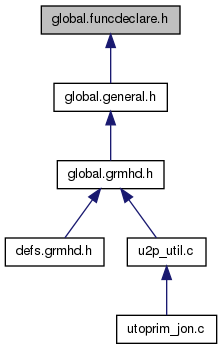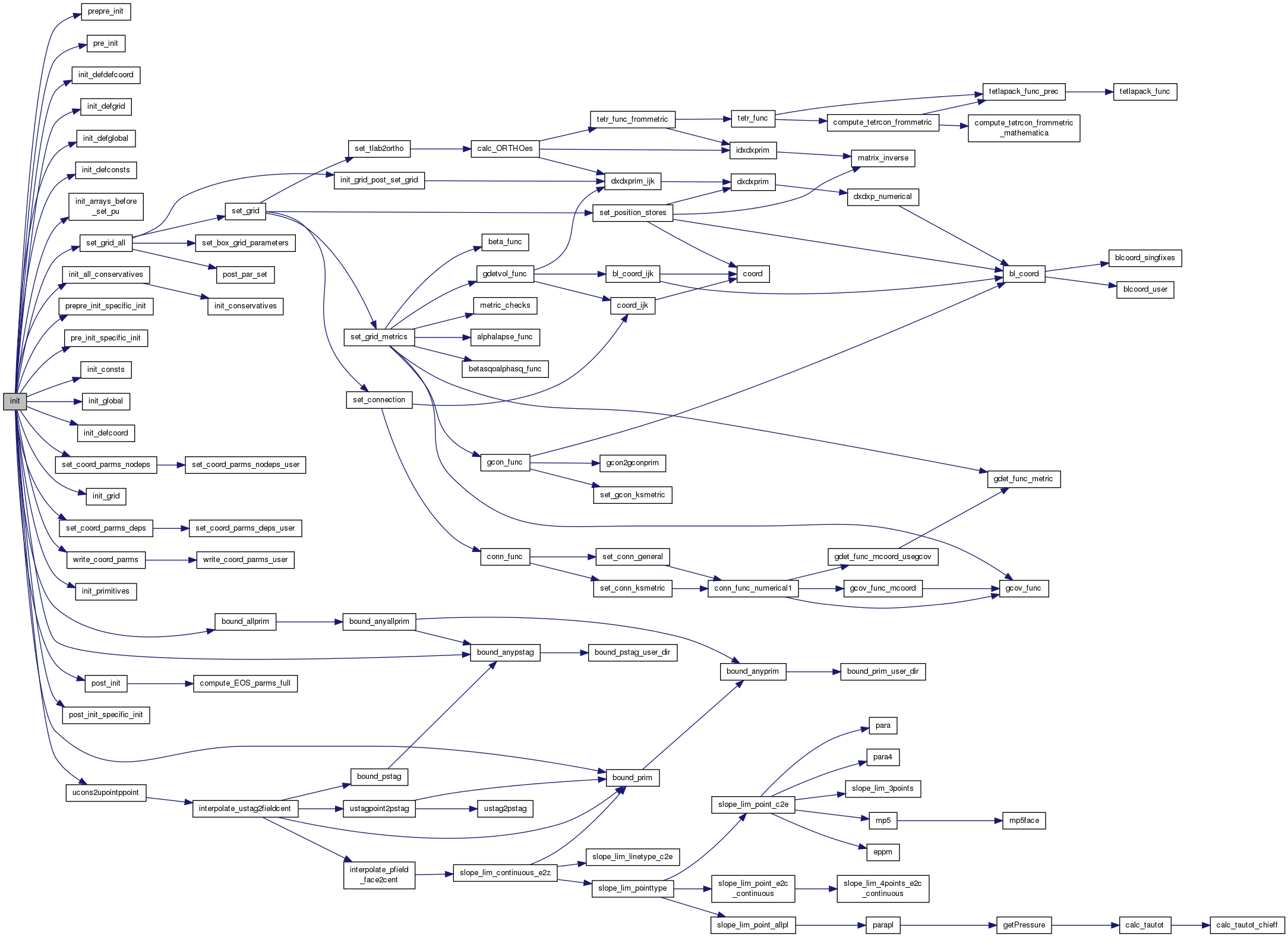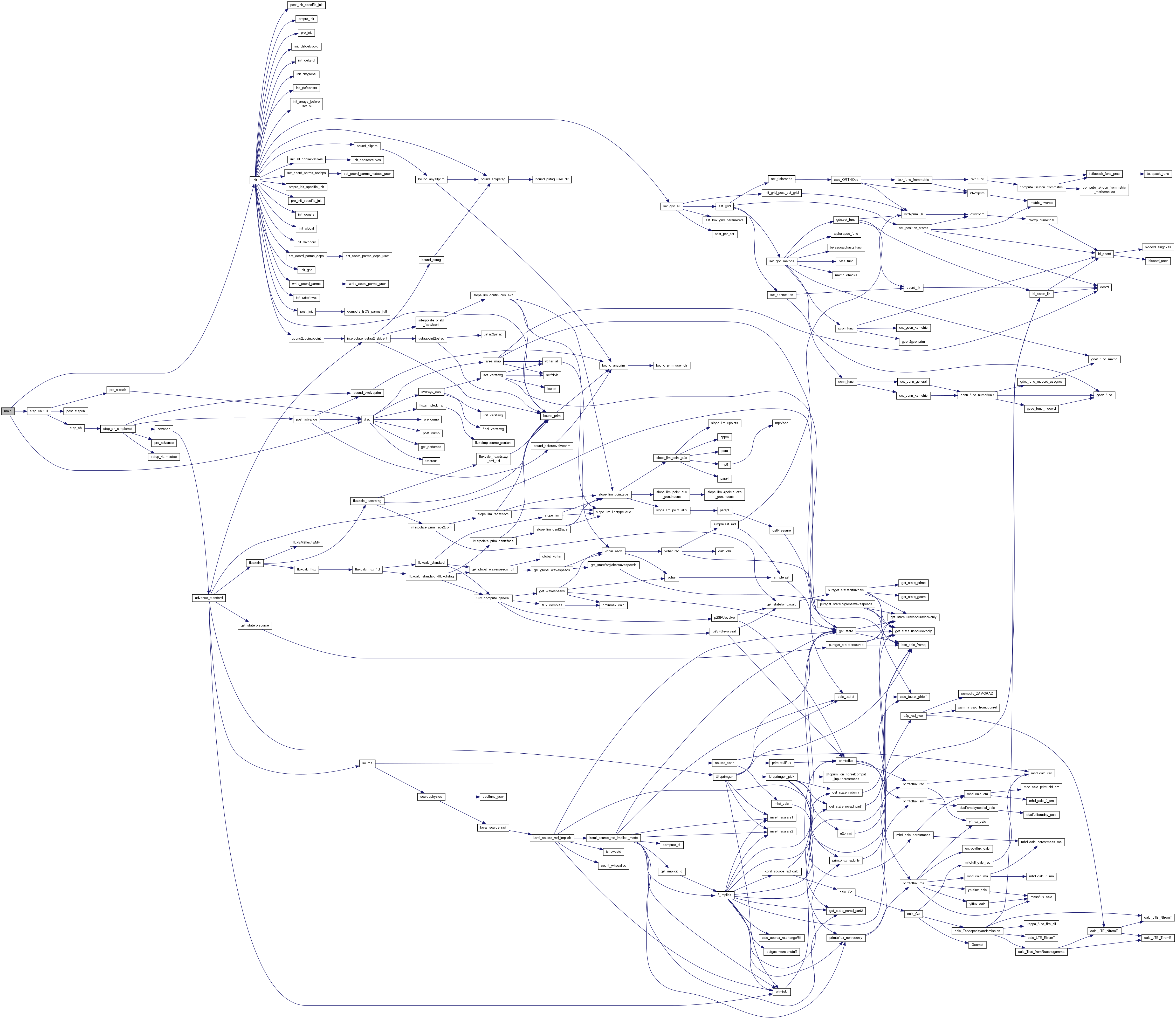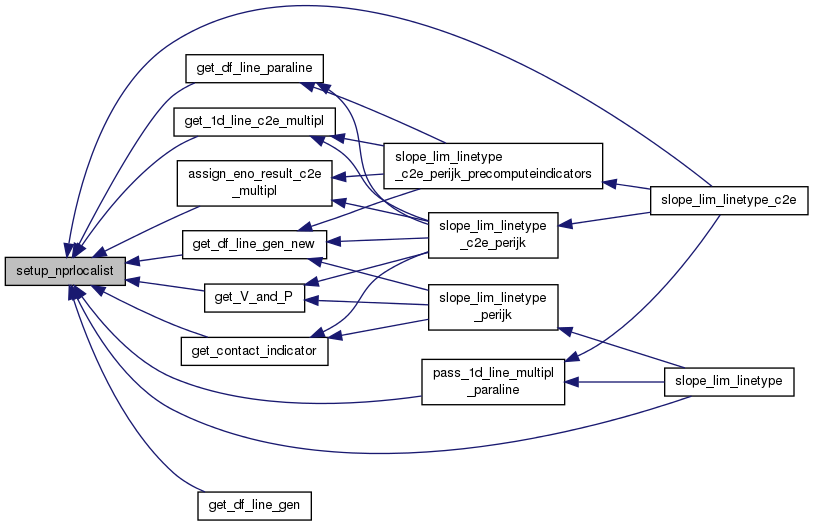|
HARM
harm and utilities
|
Function declarations (used globally) by entire code. More...
#include "copyandinit_functions.funcdeclare.h"#include "flux.funcdeclare.h"#include "metric_selfgravity_or_evolvemetric.funcdeclare.h"#include "initbase.funcdeclare.h"#include "set_grid.funcdeclare.h"#include "mpi_fprintfs.funcdeclare.h"#include "bounds.funcdeclare.h"#include "transforms.funcdeclare.h"#include "coord.funcdeclare.h"#include "metric.funcdeclare.h"#include "eos.funcdeclare.h"#include "phys.funcdeclare.h"#include "phys.tools.funcdeclare.h"#include "utoprimgen.funcdeclare.h"#include "tetrad.funcdeclare.h"#include "wavespeeds.funcdeclare.h"#include "fixup.funcdeclare.h"#include "diag.funcdeclare.h"#include "fluxvpot.funcdeclare.h"#include "nrutil.funcdeclare.h"#include "metric.tools.funcdeclare.h"#include <math.h>#include "global.funcdeclare.rad.h"#include "global.funcdeclare.user.h"

Go to the source code of this file.
Macros | |
| #define | sign(a) (copysign(1.0,a)) |
| #define | isfinite(arg) finite(arg) |
| SUPERLONGDOUBLE declarations. More... | |
| #define | assert assert_func_empty |
Functions | |
| int | main (int argc, char *argv[]) |
| Main function that primarily calls init(), diag(), and step_ch_full() in loop. More... | |
| int | init (int *argc, char **argv[]) |
| General-Primary init() routine Uses globals inside init() because sets memory and sets physics. More... | |
| int | IsLittleEndian (void) |
| void * | SwapEndian (void *Addr, const int Nb) |
| FUNCTION: SwapEndian PURPOSE: Swap the byte order of a structure EXAMPLE: float F=123.456;; SWAP_FLOAT(F);. More... | |
| int | get_fluxpldirs (int *Nvec, int dir, int *fluxdir, int *pldir, int *plforflux, FTYPE *signflux) |
| get directions for cyclic variables signflux determines signature of relationship between flux and A_i and likewise the EMF_i = - E_i As in fluxct.c: For evolution: d_t A1 = EMF1 = - E1 = F2[B3] = -F3[B2] d_t A2 = EMF2 = - E2 = F3[B1] = -F1[B3] d_t A3 = EMF3 = - E3 = F1[B2] = -F2[B1] More... | |
| FTYPE | interpn (int order, FTYPE x_eval, FTYPE x1, FTYPE f1, FTYPE x2, FTYPE f2, FTYPE x3, FTYPE f3, FTYPE x4, FTYPE f4, FTYPE x5, FTYPE f5, FTYPE x6, FTYPE f6) |
| Description: Constructs a second-order polynomial interpolating the set of points {x#, f#}, #=1..3 and evaluates it at the point x. More... | |
| void | interpfun (int interptype, int numpoints, int i, FTYPE pos, FTYPE *xfun, FTYPE *fun, FTYPE *answer) |
| to use generically (e.g. More... | |
| void | setup_nprlocalist (int whichprimtype, int *nprlocalstart, int *nprlocalend, int *nprlocallist, int *numprims) |
| functions for loop stuff More... | |
| FTYPE | sign_bad (FTYPE a) |
| assumes below get inlined much faster than macro using ? : super slow for get_geometry()'s sign() call! More... | |
| FTYPE | sign_func (FTYPE a) |
| not any faster than above (except when used alot) More... | |
| FTYPE | signavoidzero (FTYPE a) |
| much faster than macro using ? : Generally avoid using, instead do: igdet = sign(geom.gdet)/(fabs(geom.gdet)+SMALL) More... | |
| FTYPE | max (FTYPE a, FTYPE b) |
| FTYPE | min (FTYPE a, FTYPE b) |
| FTYPE | sec (FTYPE arg) |
| int | assert_func (int is_bad_val, char *s,...) |
| report More... | |
| int | assert_func_empty (int is_bad_val, char *s,...) |
| report emtpy More... | |
Function declarations (used globally) by entire code.
Definition in file global.funcdeclare.h.
| #define assert assert_func_empty |
Definition at line 330 of file global.funcdeclare.h.
| #define isfinite | ( | arg | ) | finite(arg) |
SUPERLONGDOUBLE declarations.
Definition at line 315 of file global.funcdeclare.h.
Definition at line 222 of file global.funcdeclare.h.
| int assert_func | ( | int | is_bad_val, |
| char * | s, | ||
| ... | |||
| ) |
report
Definition at line 3006 of file initbase.c.
| int assert_func_empty | ( | int | is_bad_val, |
| char * | s, | ||
| ... | |||
| ) |
report emtpy
Definition at line 3000 of file initbase.c.
| int get_fluxpldirs | ( | int * | Nvec, |
| int | dir, | ||
| int * | fluxdir, | ||
| int * | pldir, | ||
| int * | plforflux, | ||
| FTYPE * | signflux | ||
| ) |
get directions for cyclic variables signflux determines signature of relationship between flux and A_i and likewise the EMF_i = - E_i As in fluxct.c: For evolution: d_t A1 = EMF1 = - E1 = F2[B3] = -F3[B2] d_t A2 = EMF2 = - E2 = F3[B1] = -F1[B3] d_t A3 = EMF3 = - E3 = F1[B2] = -F2[B1]
For initialization: A1 = F2[B3] = -F3[B2] A2 = F3[B1] = -F1[B3] A3 = F1[B2] = -F2[B1] B1 = d_2 A3 - d_3 A2 B2 = d_3 A1 - d_1 A3 B3 = d_1 A2 - d_2 A1
opposite ordering required to be used when F[odir1] doesn't exist because N[odir1]==1 Should use signflux when changing between A_i <-> flux
Definition at line 25 of file fluxvpot.c.

| int init | ( | int * | argc, |
| char ** | argv[] | ||
| ) |
General-Primary init() routine Uses globals inside init() because sets memory and sets physics.
Definition at line 21 of file initbase.c.


| void interpfun | ( | int | interptype, |
| int | numpoints, | ||
| int | i, | ||
| FTYPE | pos, | ||
| FTYPE * | xfun, | ||
| FTYPE * | fun, | ||
| FTYPE * | answer | ||
| ) |
to use generically (e.g.
for parabolic interpolation), call like: interpfun(QUADRATICTYPE,3,1,realposition,array from 0 of positions, array from 0 of values, output of answer);
Definition at line 91 of file math.tools.c.
| FTYPE interpn | ( | int | order, |
| FTYPE | x_eval, | ||
| FTYPE | x1, | ||
| FTYPE | f1, | ||
| FTYPE | x2, | ||
| FTYPE | f2, | ||
| FTYPE | x3, | ||
| FTYPE | f3, | ||
| FTYPE | x4, | ||
| FTYPE | f4, | ||
| FTYPE | x5, | ||
| FTYPE | f5, | ||
| FTYPE | x6, | ||
| FTYPE | f6 | ||
| ) |
Description: Constructs a second-order polynomial interpolating the set of points {x#, f#}, #=1..3 and evaluates it at the point x.
Interpolation is performed using the standard Lagrange method. Arguments: x_eval – abscissa of a point where an interpolated value is to be evaluated x1, x2, x3 – set of abscissas; should all be different; can come in any order f1, f2, f3 – set of function values at the above abscissas, i.e. f# = f( x# ), # = 1..3
Definition at line 20 of file math.tools.c.
| int IsLittleEndian | ( | void | ) |
Definition at line 56 of file initbase.tools.c.
| int main | ( | int | argc, |
| char * | argv[] | ||
| ) |
Main function that primarily calls init(), diag(), and step_ch_full() in loop.
Definition at line 232 of file main.c.

Definition at line 2948 of file phys.tools.c.
Definition at line 2957 of file phys.tools.c.
Definition at line 508 of file metric.tools.c.
| void setup_nprlocalist | ( | int | whichprimtype, |
| int * | nprlocalstart, | ||
| int * | nprlocalend, | ||
| int * | nprlocallist, | ||
| int * | numprims | ||
| ) |
functions for loop stuff
Definition at line 970 of file initbase.c.

assumes below get inlined much faster than macro using ? : super slow for get_geometry()'s sign() call!
Definition at line 2914 of file phys.tools.c.
not any faster than above (except when used alot)
Definition at line 2923 of file phys.tools.c.
much faster than macro using ? : Generally avoid using, instead do: igdet = sign(geom.gdet)/(fabs(geom.gdet)+SMALL)
Definition at line 2936 of file phys.tools.c.
| void* SwapEndian | ( | void * | Addr, |
| const int | Nb | ||
| ) |
FUNCTION: SwapEndian PURPOSE: Swap the byte order of a structure EXAMPLE: float F=123.456;; SWAP_FLOAT(F);.
Definition at line 65 of file initbase.tools.c.
 1.8.3.1
1.8.3.1